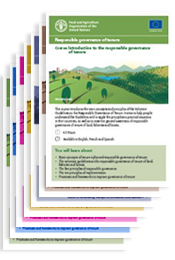Governance of tenure newsletter - July 2023
The “Voluntary Guidelines on the Responsible Governance of Tenure of Land, Fisheries and Forests in the Context of National Food Security” are referred to as the “Voluntary Guidelines" or the VGGT in this newsletter.
- Towards a Global dialogue on Water tenure
- What makes water tenure different?
- The Land-Water Nexus: Communities (and Women’s) Water Tenure Security Depends on Better Integration
- The security of water tenure
- Guinea launches a participatory process towards the preparation of a National Land Policy
- New publications
- E-Learning
Towards a Global dialogue on Water tenure
By Sasha Koo Oshima - Deputy Director Land and Water Division (NSLD)
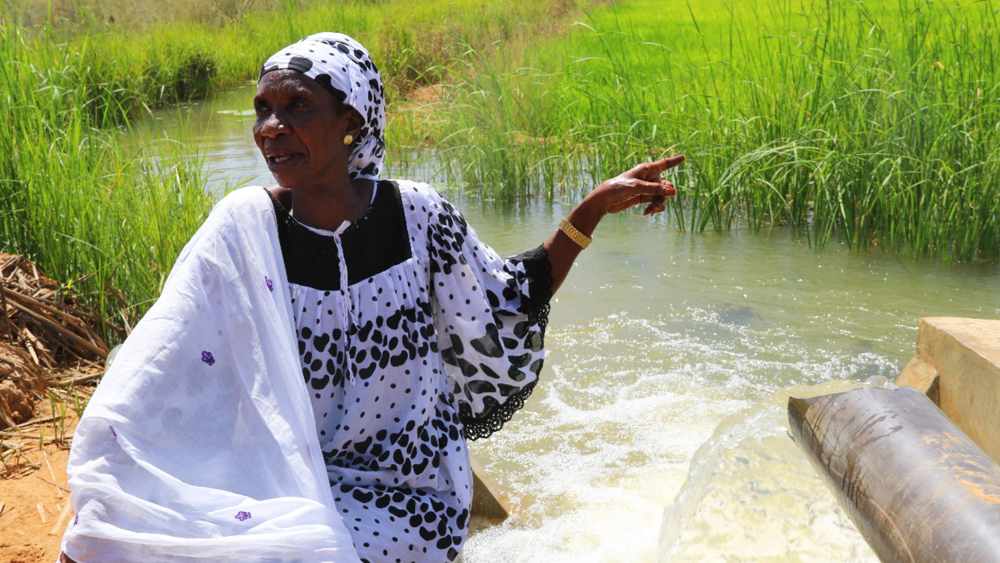
© FAO/KNOWAT project
With more than 733 million people currently living in areas of high or critical water stress1 and a projected 30 percent increase in global water demand by 20502, water allocation has never been more important. On the other hand, 77 percent of smallholder farms in water scarce regions of low- and middle-income countries lack irrigation access, highlighting the challenges of water and food security (FAO, 2021). In rural areas, water users often relies on customary arrangements for water allocation that may or may not be legally recognized or protected. To effectively address water scarcity and sustain rural populations, it is crucial to consider these arrangements. Customary tenure arrangements, including those benefiting Indigenous Peoples, local communities, women, and youth, play a significant role in securing access to natural resources (ELI & RRI, 2021)3.
During the past 5 years, drawing on the definition of water tenure as “the relationship, whether legally or customarily defined, between people, as individuals or groups, with respect to water resources.” (FAO, 2020)4 FAO has collaborated with government institutions, civil society organization and academia to build knowledge and inform policy on water rights and allocation systems. Drawing on the exercise of evaluating water tenure in Senegal, Sri Lanka and Rwanda FAO and partners have demonstrated the usefulness of the water tenure concept to analyze the relationships of people with respect to water resources at local and country levels. Water tenure assessment helps identify opportunities and shortcomings of water governance systems to guarantee secure access to water resources for all legitimate water users.
Building on the lessons of these studies, informed by the VGGT and recommended by the FAO Committee on Agriculture, FAO has embarked in a Global Dialogue on Water Tenure to discuss principles on the responsible governance of water tenure in an inclusive consultative process with Member States, civil society, academia, and international organizations. At the UN Water Conference in March 2023, FAO announced the Global Dialogue on Water Tenure as a commitment to the Water Action Agenda. The Global Dialogue on Water Tenure has the potential to function as a platform for inclusive discussions among all stakeholders, making valuable contributions to the discourse on legitimate water rights and fostering environmental and social justice.
1 FAO and UN Water. 2021. Progress on the level of water stress: Global status and acceleration needs for SDG indicator 6.4.2, 2021. Rome. https://doi.org/10.4060/cb6241en.
2 Under a Business as Usual Scenario, FAO. 2021. The State of the World’s Land and Water Resources for Food and Agriculture - Systems at breaking points. Synthesis report 2021. Rome. https://www.fao.org/documents/card/en/c/cb7654en
3 Rights and Resources Initiative (RRI), ELI. 2021. Whose Water? A Comparative Analysis of National Laws and Regulations Recognizing indigenous Peoples’, Afro-Descendants’ and Local Communities’ Water Tenure. https://rightsandresources.org/publication/whose-water/
4 FAO. 2020. Unpacking water tenure for improved food security and sustainable development. Land and Water Discussion Papers. Rome. https://www.fao.org/3/cb1230en/cb1230en.pdf
What makes water tenure different?
By Van Koppen, Barbara Emeritus - Scientist International Water Management Institute (IWMI-South Africa)
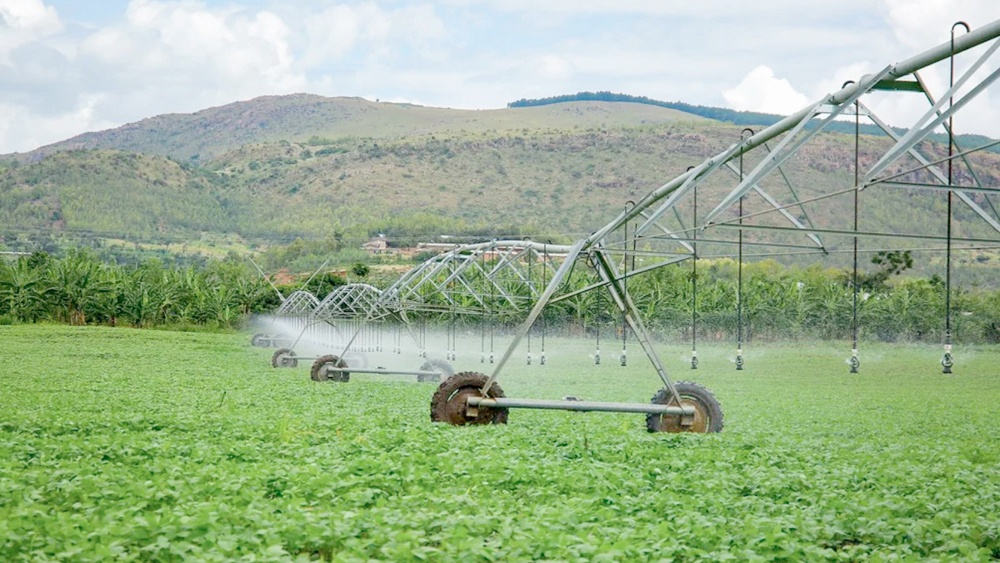
© FAO/KNOWAT project
How can the VGGT principles of transparency, participation, equity, justice, gender-equality and accountability in resource tenure hold for water tenure? We explore whether this differs for, on the one hand, the governance of the climate-dependent global hydrological cycle of precipitation, surface run-off, streams, lakes, wetlands, seas, evaporation or recharged aquifers, and, on the other hand, people’s governance to store, lift and convey water through infrastructure. With few exceptions of direct uses, such as fisheries, water-dependent life depends on both (Pollution prevention is not further considered here).
Water resources in the global hydrological cycle are given by nature for free. In most countries, governments are the public trustee of this precious national treasure both in transboundary water sharing and internally. Land location, upstream or downstream, or above aquifers, influences ease of access, but this rarely entitles to exclusive rights. Especially during dry seasons, spells and droughts, water resources may have to be ‘shared in’ within a community, or ‘shared out’ with neighbouring communities, or ‘shared out’ at higher and even transboundary scales. Equity and justice in such sharing often boils down to prioritization. According to the VGGT principles, water resources that contribute to realizing constitutional and human rights and national goals have a higher priority than other uses. This not only includes drinking water and other domestic uses, but also rights to food, adequate standard of living, culture, non-discrimination, gender and racial equity, good nutrition, etc. Prioritization becomes even more urgent when environmental flows require curtailment of existing or future uses.
Ensuring transparency, participation, and justice exposes the well-documented inequalities between the majority of citizens whose basic needs are still unmet and often relatively few high-impact users, who disproportionally benefit, often for luxury uses. For example, colonial water legislation overrode customary water tenure, a legacy that often continues, especially in sub-Saharan Africa. Or in formerly colonized high-income countries, high-impact water users not only caused water resource scarcity but also claim that their entitlements to the national trust are tradable private property, excluding all other citizens. Similarly, in foreign investment contracts, corporate business can dictate governments to provide water resources, whatever the impacts on all citizens.
However, without infrastructure, even the strongest rights to water resources will be futile: water flows by or remains underground. Inequities in water resource sharing are preceded by unequal access to land-bound infrastructure to store and convey water in the right quantity, quality at the right time to the right site of use (premises, agricultural fields, and other sites of water use, such as cattle dams in pastures). Whether soil moisture retention, carrying water cans, small-scale irrigation or large-scale inter-basin transfers or desalination plants, Infrastructure always has a price: human efforts to construct/install, operate and maintain. Those deploying those efforts have stronger but, again, rarely exclusive, claims to the water stored and conveyed. (Co-)investors can be governments, NGOs or individual, self-organized sub-groups or entire communities of smallholders and pastoralists or in low-income informal rural economies. Overcoming the fragmented administrative silos, FAO’s Mapping Systems and Services for Multiple Uses of Water Services (MASSMUS) approach taps the benefits of multi-purpose infrastructure. In sum, under growing competition for water resources, VGGT principles in water tenure explore accelerated targeted, transparent, participatory and gender-equitable support for just infrastructure development and the public trustee’s priority allocation of water resources that flow into such existing or future infrastructure.
The Land-Water Nexus: Communities’ (and Women’s) Water Tenure Security Depends on Better Integration
By Jessica Troell - Senior Attorney Director, International Law Institute (ELI)

© FAO/KNOWAT project
The community-based tenure systems used by Indigenous Peoples and local communities (IPLCs) around the world regulate access to and use of natural resources on at least half of the global landmass. In recent years, progress realized from focusing on the conceptualization and advocacy for secure, community-based land and forest rights has highlighted the need for more focused attention to IPLCs’ community-based water tenure rights. Indeed, the traction that the concept of water tenure has gained in the global policy arena is at least partially attributable to a growing awareness of the inherent ecological, legal, and socio-economic linkages between terrestrial and water resources, coupled with the critical role of sustainable freshwater security in achieving sustainable and climate-resilient rural livelihoods and food security.
Research undertaken by the Environmental Law Institute (ELI) and the Rights and Resources Initiative (RRI) across 15 countries in Africa, Asia, and Latin America clearly demonstrates the critical role that legal nexuses between land and water tenure play in ensuring accessible, secure, and meaningful water tenure rights to IPLCs. This work found that communities’ freshwater rights are dependent on their recognized land and/or forest rights – or have a “land-water nexus” – in over 60 percent of the community water tenure regimes identified. It also found that water tenure regimes with a land-water nexus provided more consistent recognition of a wider range community-based freshwater rights. In some countries (such as Liberia), the land/water nexus provides the only source of community-based water tenure rights.
An important aspect of these land- (and forest-) water nexuses is the diversity of laws from which they emanate – including national constitutions, water, land, agricultural, forest, and environmental framework laws, among others. This diversity underlines the need for improved legal harmonization across sectoral laws. Land and forest laws frequently mention water only implicitly and water laws rarely speak directly to the legal status of communities’ customary or collective water resource rights. This means that, while the land-water nexus provides more options for the recognition of communities’ water rights, where there are contradictions or lack of clarity between laws, communities’ water rights can be left open to legal challenges.
Land-water nexuses are particularly important in countries where communities’ water tenure rights hinge on the interface between their customary laws and government-issued laws that may or may not recognize those customary rights. Explicit recognition of customary water tenure rights is rare, highlighting again the need for more effective harmonization across relevant laws to ensure tenure recognition and security.
Finally, a critical aspect of the nexus is its salience to the water tenure rights of women within IPLCs. Broadly speaking, explicit recognition of women’s water tenure rights is rare – less than one-third of the community water tenure regimes examined by ELI and RRI recognized governance rights for community women and even fewer recognized women’s water use rights. As with customary rights, these rights are also often dependent on a legal land- (and forest-) water nexus. This implies a strong need not only to strengthen women’s land and forest tenure rights more broadly, but also to ensure that where water tenure rights are based in land-based legislation and practices, that they are better harmonized with water legislation, as well as with inheritance and marriage laws, among others.
By Stephen Hodgson - Senior Legal consultant FAO
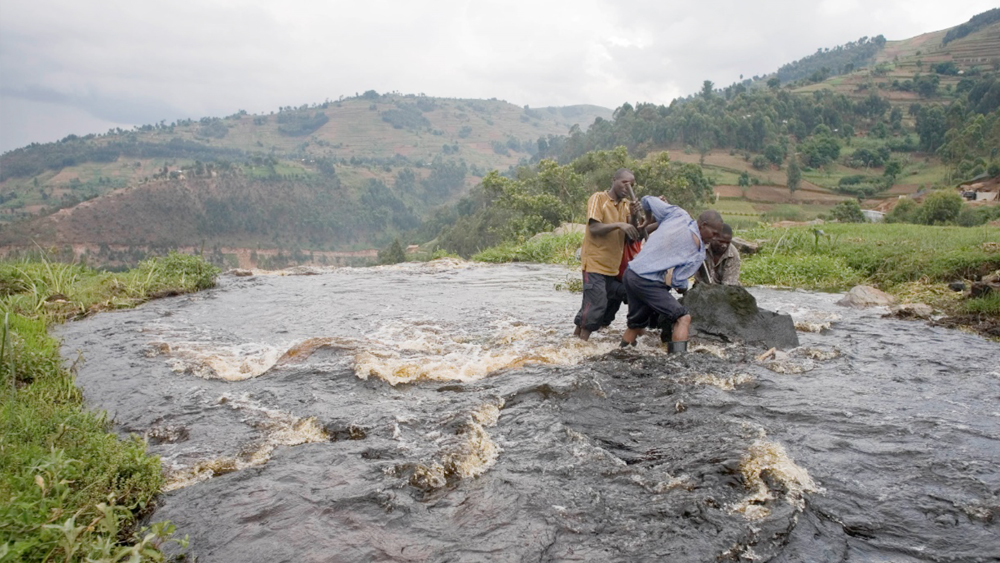
© FAO/KNOWAT project
Just as security of tenure is a fundamentally important aspect of land tenure, the same holds true for water tenure. Differences in the nature of the resources themselves usually explain the different approaches to conferring security of tenure.
One key difference is that in terms of conferring formal water tenure security, few if any legal systems admit the possibility of private ownership of water resources. Instead, formal security of tenure is conferred through permits or other instruments that confer long term use rights to abstract and/or impound and use water resources. Land ownership is of course but one type of tenure arrangement, and water use rights are not so dissimilar to use rights over land created on the basis of statute or leases. Water rights are created on the basis of water legislation for a defined for a defined period of time and recorded in a formal register. Water legislation increasingly recognises water tenure arrangements that are not created on the basis of formal law, such as customary water tenure, although in practice reconciling such rights with formal rights is often challenging.
Another important difference, alluded to in the previous paragraph, is that formal water tenure arrangements are typically concerned with the abstraction/impoundment and use of water resources and not occupation as is often the case with land tenure arrangements (although not with types of land tenure arrangement such as rights relating to servitudes or mortgages). This has important practical implications as far as the security of water tenure is concerned. Water legislation typically seeks to provide that new water tenure rights created upstream do not adversely impact existing downstream rights. Water resources planning, usually undertaken in a participatory manner, seeks to reconcile competing interests on a water course, much as land use planning seeks to reconcile different uses of land. A key difference here is that the planning process directly or indirectly impacts not only the use of the resource but also the tenure arrangements themselves in terms of the volumes of water that can be used and even the duration of the rights so created.
While legislation can confer legal security of tenure, a far bigger challenge as regards water tenure derives from the fluid, fugitive and above all the renewable nature of the resource itself. Legal security on paper (and in a register) is only of value if there is actually sufficient water in the watercourse concerned, of a quality appropriate for the intended use (and globally speaking there is a growing water quality problem). In contrast to land plots, which once surveyed and demarcated usually remain in place subject to whatever tenure arrangements that may apply to them, effective water resources management is an additional prerequisite for water tenure security, so as to ensure that sufficient water is left within rivers and other watercourses to satisfy societal needs as well as the needs of the environment. This in turn implies a need for effective water governance.
Guinea launches a participatory process towards the preparation of a National Land Policy
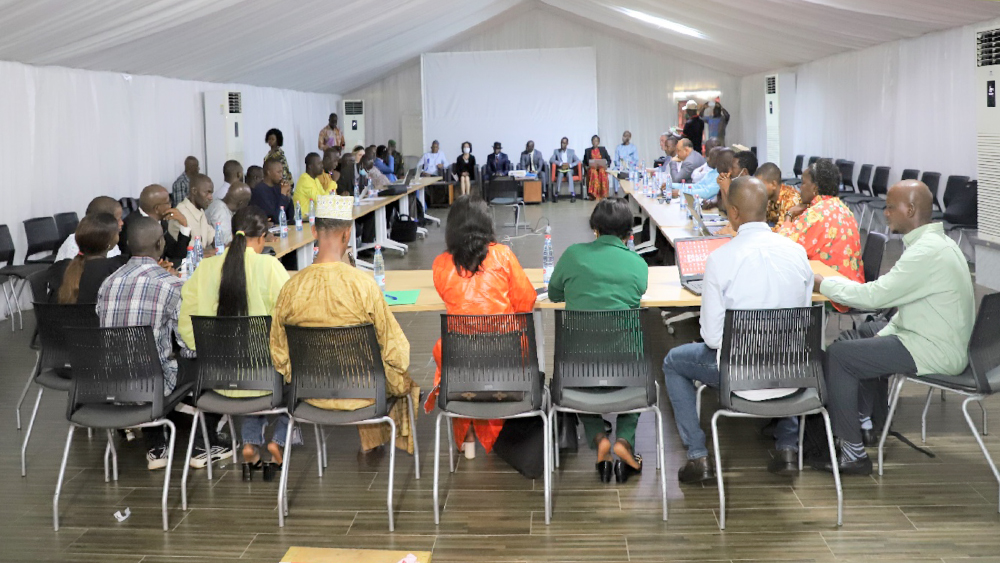
© FAO/Ingeborg Gaarde
On June 7, 2023, the Food and Agriculture Organization of the United Nations (FAO) supported a workshop to launch the process towards the preparation of a national land policy in Guinea, Conakry. The workshop was organized by the national multi-stakeholder platform (MSP) on land governance in the country. It brought together local, civil society actors and private sector representatives.
The Minister of Urban Planning, Housing and Territorial Development, opened the event and applauded FAO and other technical and financial partners for the continued support for improving the governance of tenure in Guinea.
FAO has played a central role in building new dynamics to improve governance of tenure in Guinea Since 2018 through its support to the MSP and for organizing of the Etats Généraux du Foncier (EGF), a high-level forum aiming at building a national roadmap for improving governance of tenure that took place on November 14-17, 2022.
A joint roadmap for an inclusive land reform process
The workshop led to the agreement of a joint roadmap for an inclusive land reform process to prepare the next steps for the land policy formulation process which will be: I) capitalization of the results of the Etats Généraux du Foncier II) local consultations in the four geographical regions of the country and III) identification of the main strategic orientations of the land policy.
To ensure a solid and concerted support to the land reform process, FAO has taken the initiative of establishing a group of technical and financial partners to meet on a regular basis for coordinating the support to the national land reform process. Members of this group are FAO, UN-habitat, the UN Economic Commission for Africa, UNDP, AFD and GIZ.
The aim is to expand this group of partners along the way to strengthen the synergies and joint actions to assist the inclusive reform process in Guinea.
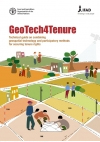
GeoTech4Tenure
In line with the VGGT, public and private investments globally are increasingly recognising responsible land governance as a determinant for the success and sustainability of their achievements. Investment managers understand that preventing and mitigating tenure related issues is a necessary step to achieve their objectives. This guide provides readers with a basic understanding of the functional linkages between land tenure and land-based investments.
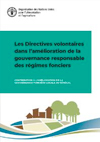
Les Directives volontaires dans l’amélioration de la gouvernance responsable des régimes fonciers.
Contribution à l'amélioration de la gouvernance foncière locale au Sénégal
La présente étude est une capitalisation des principaux résultats en termes d’outils, de produits ou de processus obtenus dans le cadre du projet de la FAO sur les Directives volontaires pour une gouvernance responsable des régimes fonciers applicables aux terres, aux pêches et aux forêts dans le contexte de la sécurité alimentaire au Sénégal, durant la période allant de 2017 à 2019. Cette capitalisation se concentre sur les processus par lesquels des connaissances implicites sur le foncier sont rendues explicites et diffusées auprès des populations.
A wide variety of e-learning courses are available on the Responsible Governance of Tenure. Learn about:
- making access to land, fisheries and forests more equitable
- how to protect people's tenure rights
- options to simplify the administration of tenure and make it accessible to all
- how to ensure disputes are resolved before they degenerate into conflict

